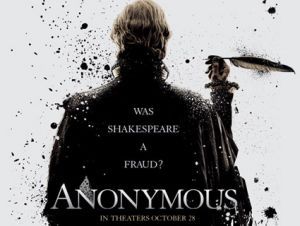In “The Bard of Our Time,” her compelling analysis of the new movie Anonymous, Sørina Higgins struggles to connect the message of the movie—elites are the holders of power and the creators of culture—with the today’s zietgeist—the 99% should take power away from the 1%. She opines:
The message of Anonymous is essentially that a normal guy, an average middle-class fellow, could not achieve greatness. Why this message, now, when the “little guy” (or girl) is occupying the public square, storming the financial district, toppling dictators, and instituting democracy? If the little fellow, or the young person with an ordinary education, can overthrow a government, why can’t he write a few dozen popular plays?
This opinion connects with David Thomas’s commentary “Lost in the Four Quartets,” on Eliot’s four conceptual chapbooks of poetry. As I read the two essays in unison, it made me wonder how, like in the Four Quartets, time can affect the meaning; or, in this case, time can affect the authorship.
Who knows how the authorship of Eliot, who died less than fifty years ago, will be challenged in future generations by scholars with too much time and grant money on their hands (which is my opinion of the scholars who challenge Shakespeare’s authorship). Eliot is a person who, while certainly having more formal schooling than Shakespeare, did not exactly come from the elite. His dad was the treasurer of a brick business. He did attend Harvard and Oxford, but he never finished his PhD. Instead of focusing on literature and scholarship full time, he had the extremely un-literary position of a foreign accounts banker at Lloyds Bank of London for eight years. He then finished out his career at a publishing firm, which, while more literary, could also be an extremely advantageous position for someone to publish work that was not his own. I can only imagine, in a couple hundred years, how the conspiracy theories will flow:
Eliot used his own name as a pseudonym for a poet or poets who wanted to remain anonymous. How could a schoolteacher, publisher and banker write such intellectually dense poetry?
Eliot met James Joyce on a cruise ship. Surely they made a pact to publish Joyce’s poetry under Eliot’s name…
Eliot found amazing poetry in a safety deposit box at Lloyd’s and published it under his own name…
Eliot was an editor whose focus for a number of years was soliciting poetry. He must have coyly stolen it all. Eliot is nothing more than a plagiarizer.
I could go on. I thoroughly despise this sort of conspiracy theory game, but as a game, it is a bit of fun.Want to join in?
I’ve written four different conspiracy theories for Eliot, but can you think of more?
What other author do you think some good conspiracy theories could be written about?

